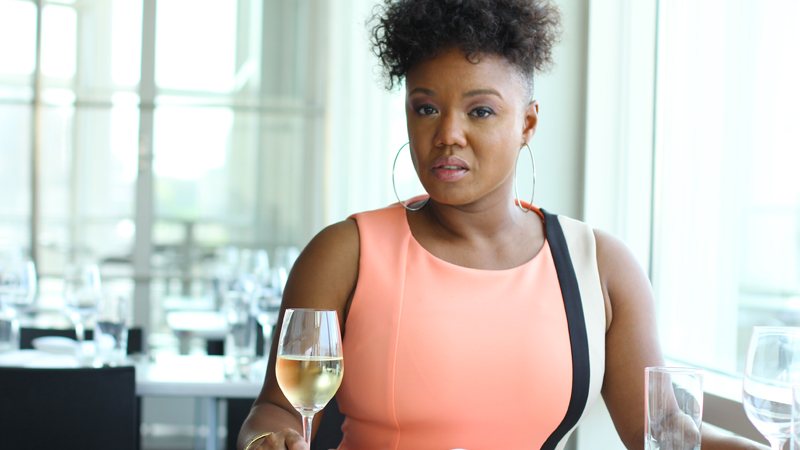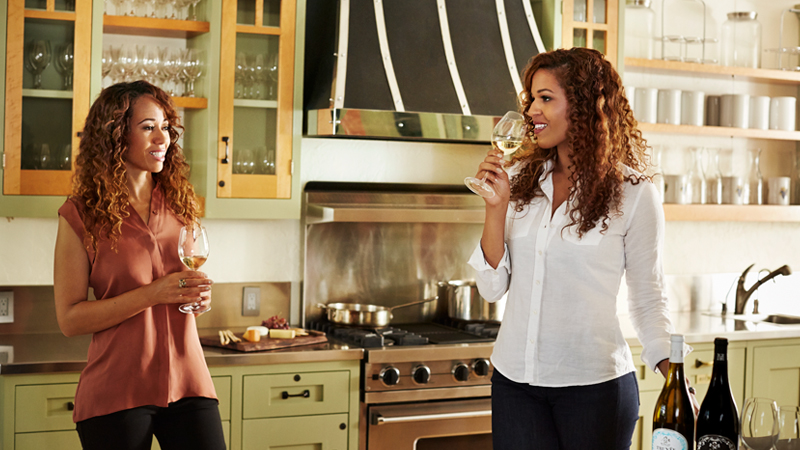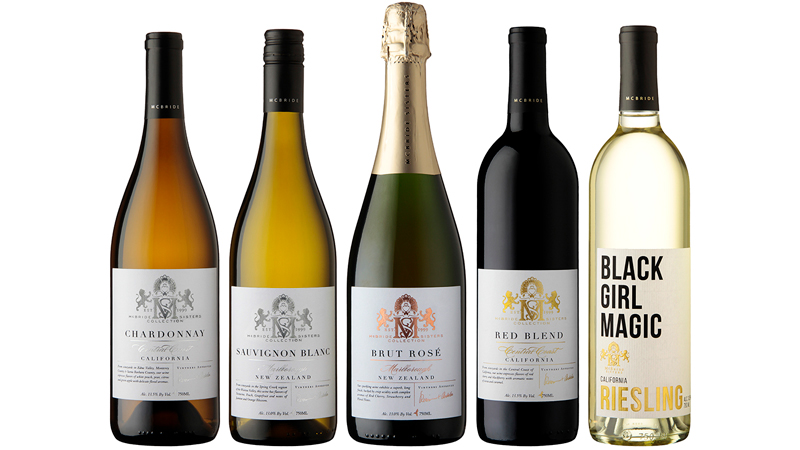There’s nothing like family. Especially the family that finds you, fully grown and ready to help you build your dreams.
Robin McBride and Andréa McBride John grew up on opposite sides of the Pacific Ocean, Robin in Marlborough, New Zealand and Andréa in Monterey, Calif. They each thought they were only children. But in 1999, they discovered they had something in common: a father.
Their father was dying from cancer in Alabama when he made a last request of his family. He asked them to find Robin, whom they had never met, and bring the girls together. After much digging through public records the sisters were united. They’ve been inseparable ever since.
Today, they own McBride Sisters Wine, the largest black-owned wine company. Both sisters were raised in wine country and had long been passionate about wine. McBride Sisters Wine produces and distributes super premium wine grown in California and New Zealand. The company opened for business in 2010 in Oakland, Calif.

“Andréa was getting ready to graduate college; I had just had twin boys and didn’t plan on going back to corporate America,” Robin says. “We figured it was now or never!”
The dynamic duo was revved up and ready to go. But there were considerable challenges, including startup capital and access to key gatekeepers in the wine industry.
“We overcame this by forming strategic partnerships that lessened up-front capital costs — and by unapologetic tenacity,” Robin says. “When it came to the gatekeepers, we had to just figure out any way possible to get access to them. Once we were in the room, it was about showcasing the value we bring to wine consumers that they currently weren’t targeting and missing out on.”
Truth is, there’s a misperception that black folks aren’t wine drinkers. However, last year, Essence surveyed its database of 500,000 women on their wine consumption. The results? Essence readers alone consume 4.3 million cases of wine a year.
There are around 50 black-owned wineries globally. Events like the Blacks in Wine Symposium this past February bring together winemakers, brand owners, retailers, and restaurants to address problems in the wine industry and create a plan for overcoming them. The Association of African American Vintners is another resource for entrepreneurs.
But the challenges weren’t only about being black. There are other realities, like being women, and African-American women in a male-dominated industry. “We faced what any other women and/or persons of color experience in industries where you find yourself as the super-minority,” Robin says. “You just continue with your vision and realize what you are doing is bigger than your individual goals.”

That’s not to say they didn’t get frustrated, of course. They just found ways to work around that.
“It’s easier to overcome challenges when you’re passionate, obsessed, and love what you do,” Robin says. “Just know that haters are going to hate, shit is going to happen out of your control you will have to overcome and solve for. And at the end of the day, what gets you through is the love and passion you have for business.”
The sisters have immense gratitude for their investors, without whom, they say, they would have not been able to fund their growth.
Today, McBride Sisters Wine’s core collection includes New Zealand Sauvignon Blanc, New Zealand Sparkling Brut Rosé, Central Coast California Chardonnay, and a Central Coast California Red Blend. All the grapes are sustainably farmed.
The sisters’ staff is mostly female, and empowering women is part of their mission. Their wine clubs include the Black Girl Magic “Plus” Quarterly Club, and the Black Girl Magic Riesling Club. According to their website, the Black Girl Magic line celebrates the “MAGIC within us that allows us to preserve, to create, and SLAY with the best and with so much finesse!”
As a private company, the McBrides don’t talk revenues or sales, but it was recently announced that they were one of the recipients of the New Voices Fund, a $100 million investment in businesses owned or managed by women of color.
“New Voices Fund is game-changing!” Robin says, though she’s mum on plans for how they will use the money. Upcoming developments for the company include a new wine tasting room, opening in early 2019.
It’s not easy getting into the wine business, period. If you’re a person of color, those challenges multiply.
“It’s hard to be taken seriously in an industry that doesn’t look like us at all,” Chrishon Lampley, the founder of Love Cork Screw wines, a negociant, says. “In such a male-dominant industry, I am always mistaken as the ambassador for the brand, and not the owner.” Founded in 2013, Love Cork Screw wines are now available in more than 50 locations including Target, Whole Foods, and many more.
Without question, the biggest hurdle for all new business owners is raising capital. The wine industry is notoriously expensive. Planting a vineyard in the United States reportedly ranges from $30,000 to $100,000 per acre. Sommelier certification through the Court of Master Sommeliers costs from $595 to $1,195 per course or exam.
There are myriad reasons why more African-Americans aren’t in the wine industry, Robin says. “Capital. Historical context. The last time African-Americans were involved in American agriculture in a major way, it involved 300 years of slavery,” she says.
Since African-Americans represent a small percentage of the wine industry, aspiring black winemakers don’t always have the same routes to funding as those whose families have been making wine in Napa, Sonoma, France, or Spain for generations.

“Whether it is buying a vineyard or winery or buying grapes or bulk wine, or expanding your current business, funding is an issue,” Mac McDonald, president of the Association of African American Vintners and owner of Vision Cellars, says. “Try finding mentorship. There’s a lack of support for hands-on learning, for vineyard work, or actually making wine. There aren’t enough folks of color doing the whole vineyard winemaking process. Then there’s the challenge of opening a tasting room to expand direct-to-consumer business and finding brokers and distributors if you want to do wholesale.”
So how can minorities break through barriers in wine? “New entrants need to understand all the different opportunities in the wine industry,” McDonald says. “Participate in educational events, and directly engage with vintners, growers, brokers, and distributors, whether it’s a two-hour seminar at a trade show or day-long classes at a local college.”
It’s a lot of work. Lampley recommends all who are interested in working in wine to ready themselves for an uphill climb.
“I have to fight to compete with companies that have been around for years,” Lampley says. “It’s not for the faint of heart. However, success is my only option, and I will succeed.”
The McBride Sisters are similarly driven. “Don’t apologize for your passion or dumb it down,” Robin says. “You’re going to have to work harder and smarter than everyone else, but that’s O.K., it will force you to be great. When you succeed, make sure you bring other African-American and women of color with you along the way!“
Robin and Andréa are also grateful for finding each other, and for the chance to pursue their passion as a team. Says Robin, “We get to turn back time and make up for the years we didn’t get to spend together.”

